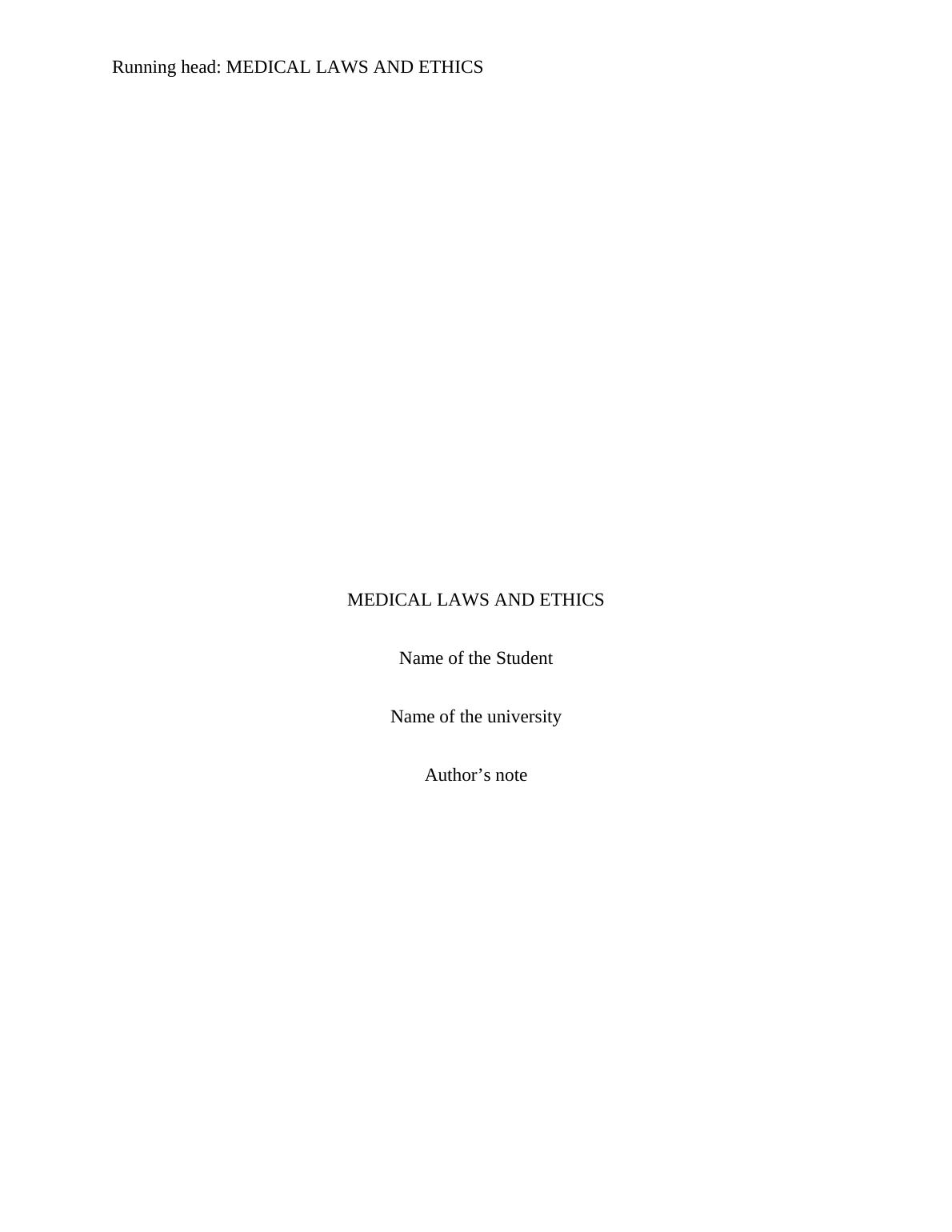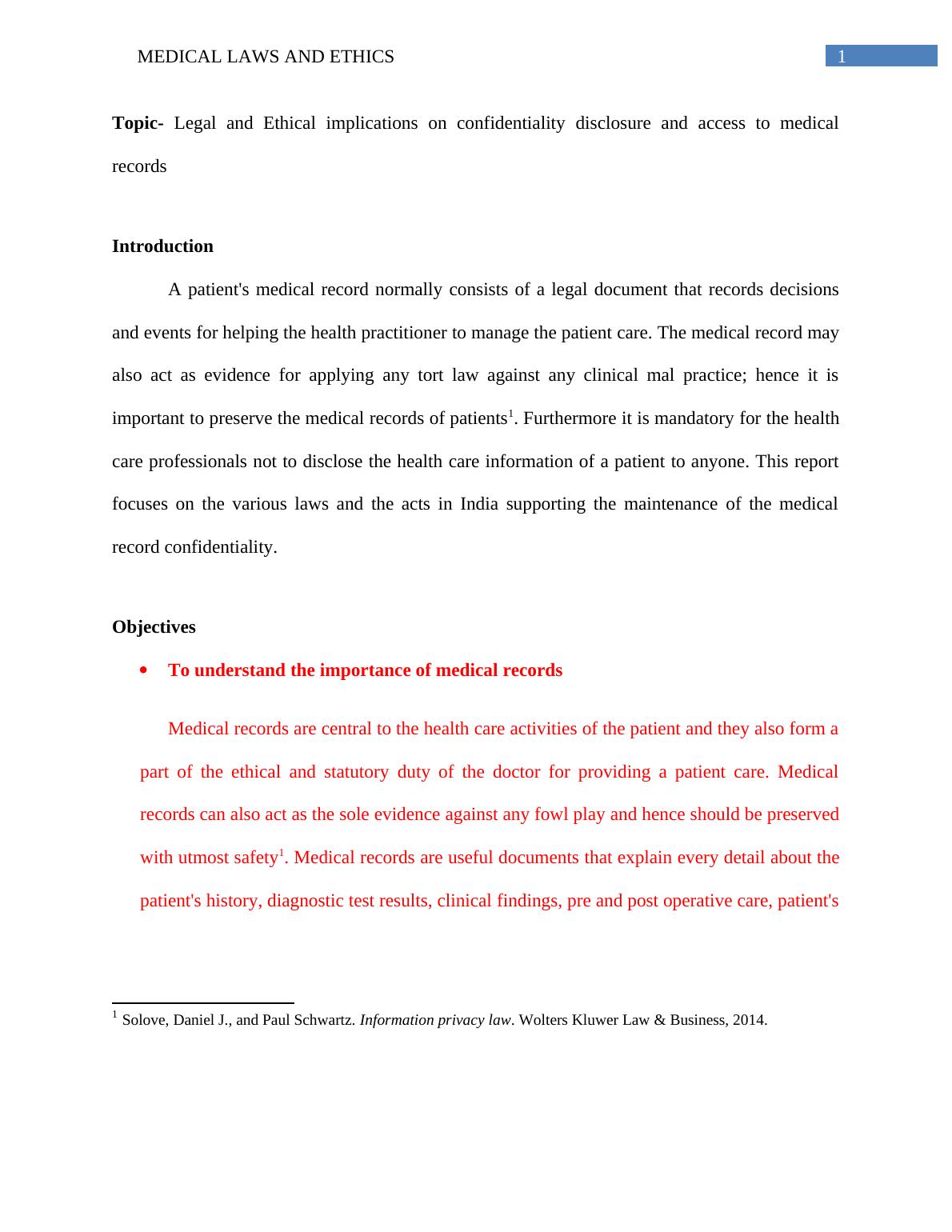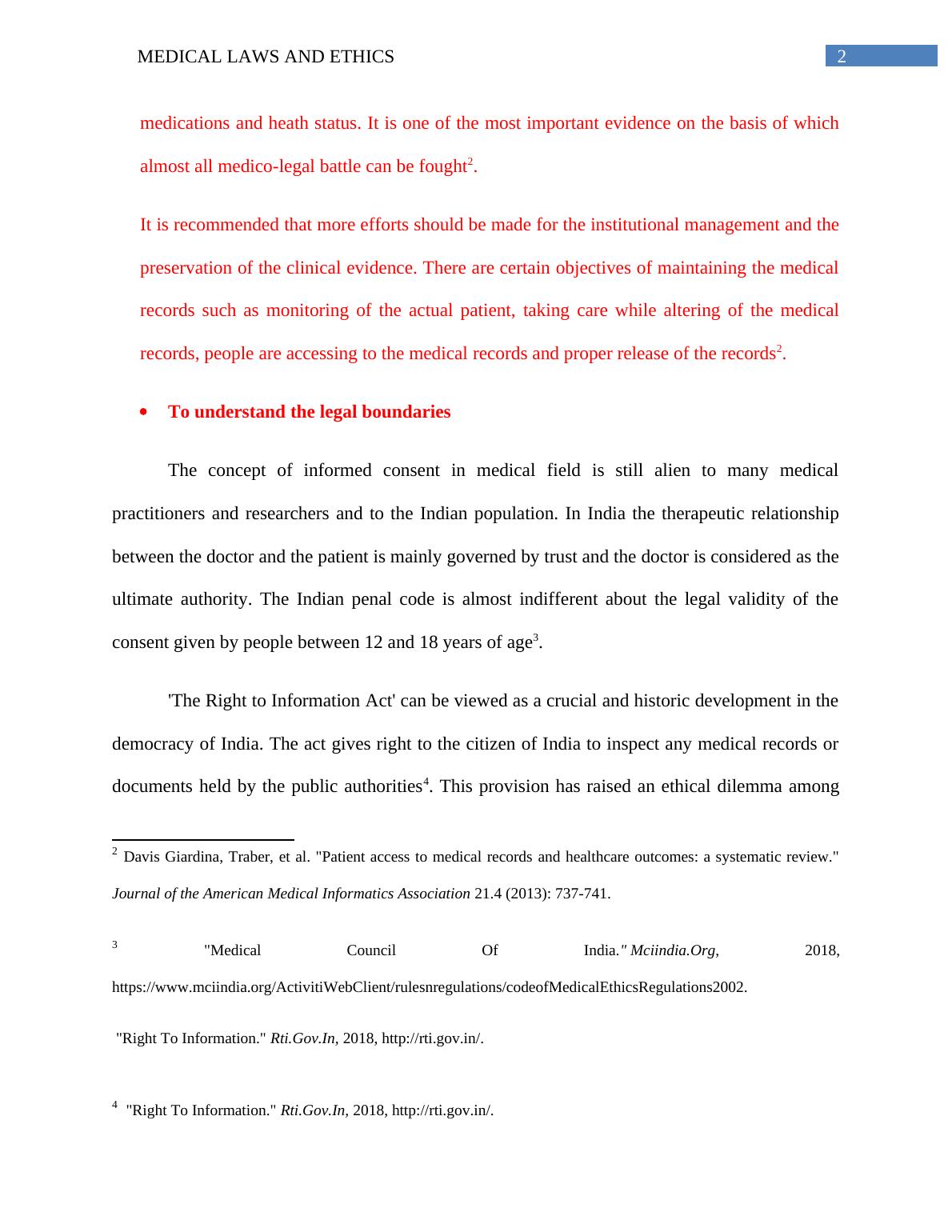Report on Medical Law and Ethics
Added on 2020-05-16
7 Pages1179 Words42 Views
Running head: MEDICAL LAWS AND ETHICS
MEDICAL LAWS AND ETHICS
Name of the Student
Name of the university
Author’s note
MEDICAL LAWS AND ETHICS
Name of the Student
Name of the university
Author’s note

1
MEDICAL LAWS AND ETHICS
Topic- Legal and Ethical implications on confidentiality disclosure and access to medical
records
Introduction
A patient's medical record normally consists of a legal document that records decisions
and events for helping the health practitioner to manage the patient care. The medical record may
also act as evidence for applying any tort law against any clinical mal practice; hence it is
important to preserve the medical records of patients1. Furthermore it is mandatory for the health
care professionals not to disclose the health care information of a patient to anyone. This report
focuses on the various laws and the acts in India supporting the maintenance of the medical
record confidentiality.
Objectives
To understand the importance of medical records
Medical records are central to the health care activities of the patient and they also form a
part of the ethical and statutory duty of the doctor for providing a patient care. Medical
records can also act as the sole evidence against any fowl play and hence should be preserved
with utmost safety1. Medical records are useful documents that explain every detail about the
patient's history, diagnostic test results, clinical findings, pre and post operative care, patient's
1 Solove, Daniel J., and Paul Schwartz. Information privacy law. Wolters Kluwer Law & Business, 2014.
MEDICAL LAWS AND ETHICS
Topic- Legal and Ethical implications on confidentiality disclosure and access to medical
records
Introduction
A patient's medical record normally consists of a legal document that records decisions
and events for helping the health practitioner to manage the patient care. The medical record may
also act as evidence for applying any tort law against any clinical mal practice; hence it is
important to preserve the medical records of patients1. Furthermore it is mandatory for the health
care professionals not to disclose the health care information of a patient to anyone. This report
focuses on the various laws and the acts in India supporting the maintenance of the medical
record confidentiality.
Objectives
To understand the importance of medical records
Medical records are central to the health care activities of the patient and they also form a
part of the ethical and statutory duty of the doctor for providing a patient care. Medical
records can also act as the sole evidence against any fowl play and hence should be preserved
with utmost safety1. Medical records are useful documents that explain every detail about the
patient's history, diagnostic test results, clinical findings, pre and post operative care, patient's
1 Solove, Daniel J., and Paul Schwartz. Information privacy law. Wolters Kluwer Law & Business, 2014.

2
MEDICAL LAWS AND ETHICS
medications and heath status. It is one of the most important evidence on the basis of which
almost all medico-legal battle can be fought2.
It is recommended that more efforts should be made for the institutional management and the
preservation of the clinical evidence. There are certain objectives of maintaining the medical
records such as monitoring of the actual patient, taking care while altering of the medical
records, people are accessing to the medical records and proper release of the records2.
To understand the legal boundaries
The concept of informed consent in medical field is still alien to many medical
practitioners and researchers and to the Indian population. In India the therapeutic relationship
between the doctor and the patient is mainly governed by trust and the doctor is considered as the
ultimate authority. The Indian penal code is almost indifferent about the legal validity of the
consent given by people between 12 and 18 years of age3.
'The Right to Information Act' can be viewed as a crucial and historic development in the
democracy of India. The act gives right to the citizen of India to inspect any medical records or
documents held by the public authorities4. This provision has raised an ethical dilemma among
2 Davis Giardina, Traber, et al. "Patient access to medical records and healthcare outcomes: a systematic review."
Journal of the American Medical Informatics Association 21.4 (2013): 737-741.
3 "Medical Council Of India." Mciindia.Org, 2018,
https://www.mciindia.org/ActivitiWebClient/rulesnregulations/codeofMedicalEthicsRegulations2002.
"Right To Information." Rti.Gov.In, 2018, http://rti.gov.in/.
4 "Right To Information." Rti.Gov.In, 2018, http://rti.gov.in/.
MEDICAL LAWS AND ETHICS
medications and heath status. It is one of the most important evidence on the basis of which
almost all medico-legal battle can be fought2.
It is recommended that more efforts should be made for the institutional management and the
preservation of the clinical evidence. There are certain objectives of maintaining the medical
records such as monitoring of the actual patient, taking care while altering of the medical
records, people are accessing to the medical records and proper release of the records2.
To understand the legal boundaries
The concept of informed consent in medical field is still alien to many medical
practitioners and researchers and to the Indian population. In India the therapeutic relationship
between the doctor and the patient is mainly governed by trust and the doctor is considered as the
ultimate authority. The Indian penal code is almost indifferent about the legal validity of the
consent given by people between 12 and 18 years of age3.
'The Right to Information Act' can be viewed as a crucial and historic development in the
democracy of India. The act gives right to the citizen of India to inspect any medical records or
documents held by the public authorities4. This provision has raised an ethical dilemma among
2 Davis Giardina, Traber, et al. "Patient access to medical records and healthcare outcomes: a systematic review."
Journal of the American Medical Informatics Association 21.4 (2013): 737-741.
3 "Medical Council Of India." Mciindia.Org, 2018,
https://www.mciindia.org/ActivitiWebClient/rulesnregulations/codeofMedicalEthicsRegulations2002.
"Right To Information." Rti.Gov.In, 2018, http://rti.gov.in/.
4 "Right To Information." Rti.Gov.In, 2018, http://rti.gov.in/.

End of preview
Want to access all the pages? Upload your documents or become a member.
Related Documents
Confidentiality in Medical Lawlg...
|28
|9056
|29
Legal Issues on Patient Confidentiality and Informed Consent in Medical Lawlg...
|36
|11951
|461
Legal And Ethical Decision Making Reportlg...
|4
|707
|17
Global Issue in Health Care - Essaylg...
|6
|1596
|46
Legal and Ethical Requirements of a Registered Nurse in Digital Healthlg...
|5
|686
|386
Assignment on confidentiality PDFlg...
|7
|1633
|24